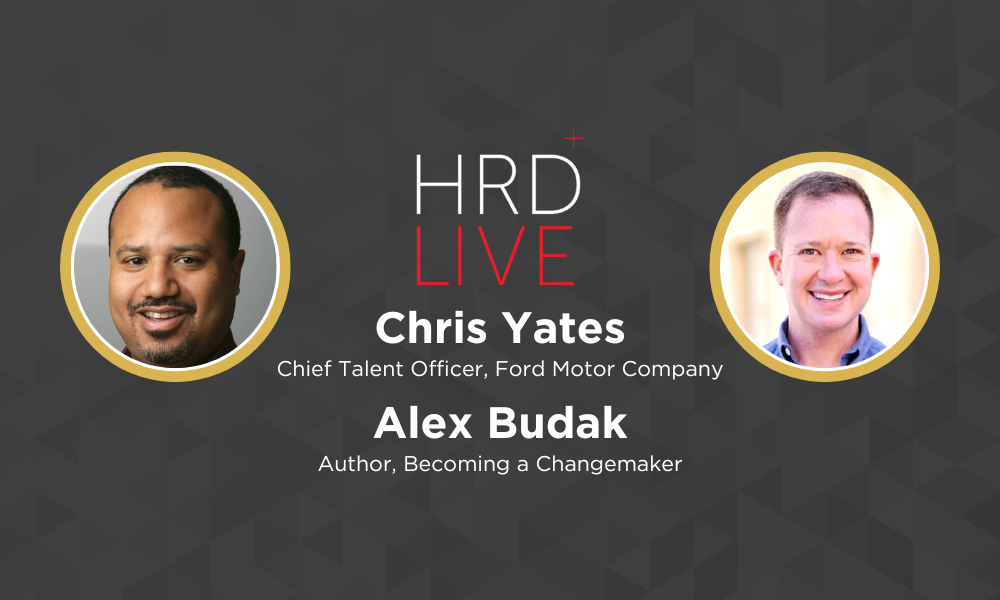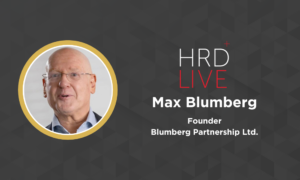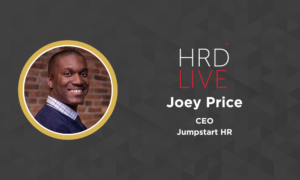Adjusting change management models to cope with rapid digital transformation
- 5 Min Read
Ford Chief Talent Officer Chris Yates and Alex Budak adapt change management models for a new era of digital disruption and chaotic change
- Author: Benjamin Broomfield
- Date published: Aug 2, 2023
- Categories

Podcast: Play in new window | Download
Subscribe: RSS
As we dive headlong into a future of work characterized by rapid change and ongoing business transformation, are traditional and transactional change management models still fit for purpose? Existing practices no longer keep up with the pace of change. New models such as Michael Arena’s network approach are gaining popularity.
In a new era of AI-enabled transformation and heightened employee expectations placing higher expectations on HR leaders, progressive change management initiatives are now a business imperative.
UC Faculty member and change management expert Alex Budak, and Ford Motor Company Chief Talent Officer Chris Yates, join the HRD Live podcast to advocate for a greater emphasis on strategic change initiatives that will engage and retain employees during a time of unprecedented change.
The era of change
Digital transformation is widespread across every industry and business model. “From the executive level down, they’re having to learn new skills and mindsets,” explains Yates. Employees previously experienced periods of change followed by time to rest and re-calibrate.
Now, change is a continuous process. Basic human fight or flight behavior dictates it’s better to be conscious of where dangers lie. When change is continuous, it creates sustained stress that quickly leads to burnout.
Budak echoes Yates’ analysis by introducing Martec’s Law, which proposes that whilst technology changes exponentially, organizations and teams grow much more slowly.
Accordingly, HR leaders must strive bridge to bridge an ever-increasing gap. To best do so, organizations must shift their focus away from transactional change management strategies to strategic change initiatives.
Building strategic change management models
Budak draws on an analysis from Patti Sanchez to emphasize the need for empathy in strategic management processes.
“50% of C-suit executives, when they leave change, don’t take into account how change will be perceived by people on the frontlines,” he explains. “It’s not just about coming up with the right strategy, it’s also about seeing people where they are, empathizing with them, and being able to generate ideas from there.”
Yates reiterates the importance of communication throughout strategic change initiatives. Whilst transactional change models very rarely involve co-creation and feedback cycles, effective leadership requires creating space and time to speak with people. “We have to be more intentional,” he argues. “I’m busy doing all of this transformational work, as we all are, and yet, to be an effective leader at this time, I’ve actually got to spend more of my time talking to people and checking in with people.”
Adjust the application, not the fundamentals, of traditional change management models
Budak and Yates agree that this approach retains many of the fundamental principles of traditional change management practices. “Chris is pointing out some of the classic research by John Kotter around making sure you communicate the vision over and over and over,” explains Budak. He continues:
“I’ve seen a lot of executives that communicate something once. We’re finding that people need to be approached in many different ways. As leaders and HR leaders, we need to communicate to people in a way that’ true to hear they are.
“You’ve got to be consistently repeating messages and finding different ways to reach people.”
Whilst traditional change management processes such as Kotter’s eight-step model require modern adaption and application, the fundamentals remain the same.
Tune in to the full episode to hear more analysis from Chris Yates and Alex Budak on adapting and applying fundamental change management principles to a new era of chaos and disruption, from navigating employee fatigue to co-creating change strategy.
Timestamps
00:09 – Introduction
01:17 – How is the digital age accelerating the rate of change at work?
05:35 – And how has this impacted the role HR leaders play in effectively managing change in the era of transparency and heightened employee expectations?
10:06 – In a fast-paced marketplace, why is it crucial for organizations to shift their focus from transactional approaches to change management and place greater emphasis on strategic change initiatives?
13:19 – How can organizations provide the necessary support, energy, and growth opportunities to engage and retain employees during times of change? With such high levels of change fatigue, is it best to prioritize and pause certain initiatives?
16:30 – What strategies and best practices can organizations employ to actively involve employees in decision-making and idea generation as part of change management initiatives?
_________________
Alex Budak is a UC Berkeley faculty member, social entrepreneur, author, and speaker. He teaches, speaks, and writes to make change less scary, leadership more accessible, and impact more inclusive. His book, Becoming a Changemaker, has been endorsed by Nobel Prize winners, Olympic athletes, and most meaningful of all—his former students who are using these ideas to change the world.
Chris Yates serves as the Chief Talent Office for Ford Motor Company and has led Values Based Leadership efforts in several organizations, including Caterpillar and Microsoft. His diverse range of experience also includes founding Ethical Organizational Design, a consulting organization in the UK that promotes ethical values in business and beyond. Chris has co-authored two books, “Rewire: A Radical Approach to Tackling Diversity and Difference”, and “Share: How Organizations Can Thrive in an Age of Networked Knowledge, Power, and Relationships”.








